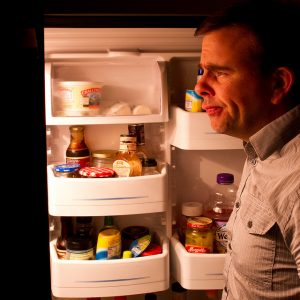How do you feel when you are hungry? Do you get quiet, impatient, how well can you focus? Sitting in class with my trivial hunger sitting deep in my stomach, I had a hard time relaxing, focusing. I found my thoughts wandering to what I was going to eat for lunch. Contemplating hunger in class was very powerful because I realized that any hunger I have felt in my life is insignificant compared to people who do not know where their next meal is coming from. How many times have you looked at the food in your fridge and thought, ‘there is nothing to eat’? This practice kept me in touch with the immense privilege I have of being able to walk a few blocks and have healthy food fingertips as well as the money to buy them. It made me conscious of the people in developing countries and ones that grew up in my same town who experience hunger regularly.

https://www.flickr.com/photos/willsan/5911562310
This contemplative practice made me feel some anger toward the thought that poverty is a result of laziness or lack of education. There may be plenty of education opportunities or motivated people in a community, but if people do not have the resources to feed themselves and are constantly hungry it becomes hard to think about anything else except where they might find food. This took me back to Amartya Sen’s discussion of hunger and the suggestion of democracy as a way to bring people out of poverty. How can a democracy function if the citizens are hungry to the point where all of their energy and resources must be focused on finding their next meal? There must be some sort of baseline standard of human wellbeing before a democracy will be able to be successful.

Kaelyn, I found your blog post on viewing world hunger through contemplative practices very inspiring. However, I was left wondering at the end of your blog post what you might have in mind for ways to reach the “baseline standard of human wellbeing”. I also wonder if you see this baseline standard of human wellbeing as something that can be translated across borders or something that is different for any given country. In class we talked a lot about hunger globally. Specifically, we watched one documentary in which we saw sustenance programs being developed in both Africa and South America. Both programs did amazing work but were strikingly different in their routes to developing “zero hunger” as the program in South America called it. It seems like based on that documentary alone there might be some differences in the way that the baseline standard of human wellbeing is achieved, so I wonder how that might play out in your mind.
Hi Kaelyn,
I take part in your frustration against the narrative that those living in poverty are simply lacking a characteristic (like education, work ethic, etc.) and I think this mentality denies the systematic and exploitative nature of wealth inequality. As you pointed out, hunger is a major part of the puzzle, and health is a definitely a precursor to much of human life. However, I think you might be misinterpreting Amartya Sen’s argument for democracy protecting against hunger. The burden of action is placed on those with resources to act in favor of those without: countries are not expected to form stable democracies on their own, but supported by fair trade, global health and development initiatives, and active action from powers like the U.S. Amartya Sen doesn’t disagree that poverty and hunger can make civil activity nearly impossible, but argues that once democracy is in place, there is incentive for governments to feed and provide for their citizens.
However, I think we should question whether democracy successfully protects well-being, and perhaps look to other perspectives (like food sovereignty) as solutions. As an example, Carolan and Pollan argue that even individuals in developed nations with general food security can be victims of the industrial food complex. In the U.S. we have the huge rise in “western diseases” like heart disease and diabetes. While U.S. citizens can have confidence that grocery stores are available, open, and cheap, they may have no idea what they are consuming. Unfortunately, even within our democracy, a lack of economic security means that the food wasted from those grocery store shelves isn’t guaranteed to reach those who are hungry or food insecure.